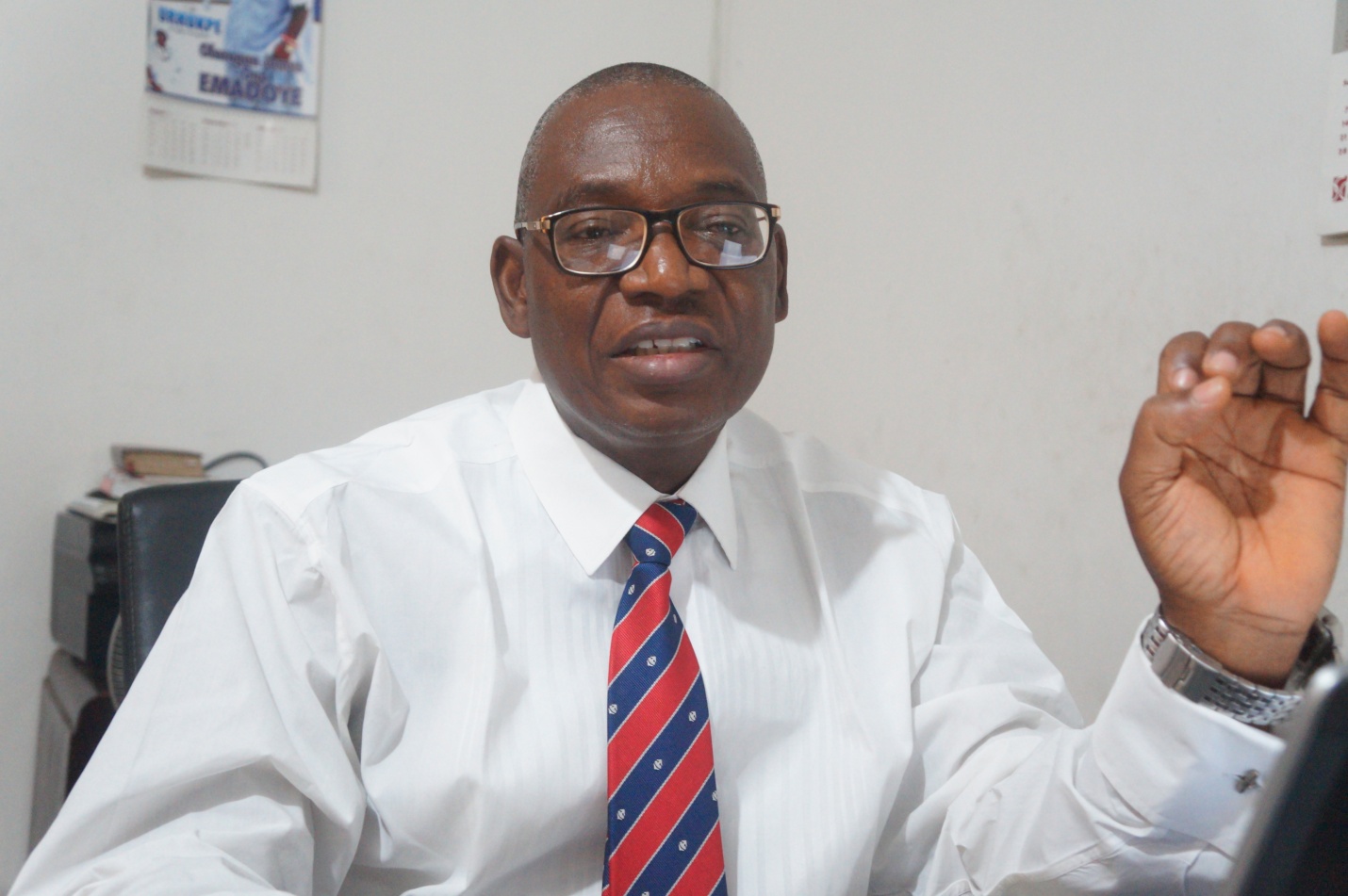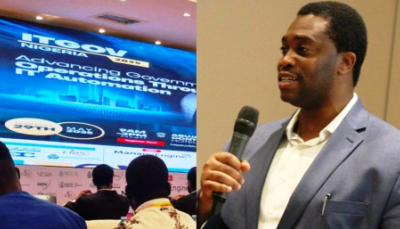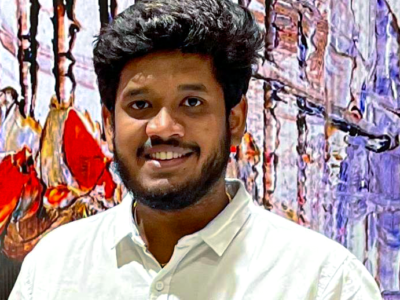The Institute of Software Practitioners of Nigeria (ISPON) is worried that strategic agencies managing the country’s data and other infrastructures that make up its national intelligence resources are being managed by foreign IT companies. ISPON’s President, Olorogun James Emadoye, tells IT Edge News, Oluwatobi Opusunju, that local content policy should entrench the principle of ensuring strategic interest projects are largely managed by local software companies, except of course, where such local knowledge are lacking. ISPON plans to change the narrative on software import and to make the country less depended on foreign solutions. It’s the country that will best benefit with lesser pressure on its FOREX portfolio and a thriving local software industry that would create more jobs and expand business opportunities. Emadoye shares with IT Edge News in Lagos.
ISPON as a body provides advocacy to develop an enabling environment for its members. With the rise in capital flight of IT services, in what ways have you been able to achieve this objective?
ISPON is an advocacy group intended to change the narratives of Nigerians from over dependency on imported goods especially as it affects software technology. Because, if you look at technology today, you will notice that it’s driven totally by software and software is something that’s produced through intelligence. The raw material you need to produce software is 80% available with us, so at ISPON, we believe that with a population of over 170 million and the youth being majority of the segment of this population, we should be able to take charge of our software needs and in fact, become a major hub for software worldwide.
But, software is a very technical thing that requires you to perfect and the only way to perfect software is by usage and that is why the first thing that needs to be done is to encourage our own people to consume locally made software produced by Nigerians, so that by the time we perfect those software products produced by Nigerians, we can now start looking at exporting to other countries.
The issue of capital flight is due to the level of corruption in the system; that is why we have this huge capital flight. A Nigerian will want by all means to buy imported goods rather than locally made goods and that’s why we have this heavy challenge in terms of unemployment. We have a situation where our graduates can hardly find work after having spent close to 16 years of studies at the university and being certified out of schools; this is the problem and ISPON is ready to continue the advocacy and the battle to ensure that in this country we recognize that there are Nigerians who are capable of doing software that our people should use rather than paying huge scarce resources in terms of dollars to import software.
Since you assumed office in 2015 as the President of ISPON, how successful can you say your advocacy for the adoption of local solution has been so far?
Well, we are recording successes. As a matter of fact, recently I got a letter, stopping one of the MDAs [ministries, departments and agencies] from importing software that we know we have alternative for in Nigeria. That letter came after we complained to NITDA [National Information Technology Development Agency] and they followed up to make sure that the MDA put a hold on the process, because Nigerians say “we have it and they cannot import it”.
That is a success story. When we saw it, we followed up and for us to be able to get NITDA to put a stop to it will tell you what we are doing in terms of local content advocacy. Also, it is left to us to invite our youths to get into the system and start churning out products because we are here to ensure that our products produced in Nigeria must be recognized first before other products.

James Emadoye: ISPON’s recipe on saving Nigeria
Each year, thousands of computer science graduates are being churned out, what is the institute doing to make sure these ones meet world class standard?
ISPON is doing a lot in that respect. We have relationship with NACOSS (National Association of Computer Science Students) where we discuss with them. Sometimes, we even go to their universities to give them industrial training and experience; to tell them what is expected of them in the industry. Not only that, we have some number of students who are doing industrial attachments in our member companies, that way they know what is expected and when they go back to school, they would continue to do that.
And of course we are also trying to work with NUC (National Universities Commission) in the area of updating the computer science program in the universities so that they are tailored made to what is expected in the industry. So a lot of activities and departments are created for them, for example , we have the Chairman of the Education Committee and there are a lot of things we are doing to make sure the computer science students are relevant when they graduate.
How do you think the government can help to create an enabling environment for local content /solution?
The truth of the matter is that the government doesn’t have a choice, they just have to create that enabling environment and I must say that the current government has taken some initiatives towards that. First of all, there is the NITDA which is supposed to regulate the industry. Secondly, the very recent executive order, No 3, signed by the Vice president or the President of the Federation is part of that enabling environment that we have been advocating for. With that executive order, it is now clear that no MDAs or government parastatals will go out to purchase software from a foreign land when the software is available locally. So that enabling environment is being created. It is now left for us in the industry to ensure that the MDAs comply. And that’s why I said earlier that we were able to stop an MDA through NITDA from acquiring foreign financial software when we know there’s a locally available alternative.
“You want to do National population census and you are using foreigners when you have thousands and thousands of capable people who can do it locally? It’s not done and it should not be done and I do believe that Nigerians and the government of the day will listen and ensure that it doesn’t happen”.
As the umbrella body for software manufacturers in the country, how secured can you say locally manufactured solutions are vis-a-vis best practices?
When you talk about security, local solution, there is really no serious difference between local solutions and any other solutions anywhere. Software only has one language; whether you are developing in India, Nigeria or USA, you are using similar languages and tools. For example, when you talk about financial system, accounting ends with the principle of double entry and so whatever you are developing anywhere in the world, you must understand that this is financial system and there is something called double entry.
By the way, when you talk about security, it has been demonstrated that Nigerians have the capacity to develop world-class software. Take the Treasury Single Account (TSA) for instance, you must have heard of how it is developed in Nigeria by Nigerians. The complaint wasn’t that it wasn’t secured and working well, it is still working and still doing what it’s supposed to do for this country. That is to tell you that we don’t have issues with security. TSA as a tool has reduced corruption and wastage in the Nigerian government spending .
The same security challenges that you will have software-wise in Nigeria is the same you will have in the US or India, so we are faced with the same thing because we are using the same tools and as such it should not be a case to say the software security developed in India or USA is more secured than the one developed in Nigeria. As a matter of fact, I have not heard that security is a challenge to any software developed in Nigeria. And today, we are all developing and working in the cloud and it’s the same thing everywhere. So security is not a unique Nigerian challenge but it’s a global challenge and all professionals worldwide are always working to ensure that systems are secure and people are able to use them without much attack.
“The same security challenges that you will have software-wise in Nigeria is the same you will have in the US or India, so we are faced with the same thing because we are using the same tools and as such
Programmers and developers are becoming popular, with a lot of Nigerian developers creating some fantastic software in the country and overseas. As the president of an organization that caters for this set of people, can you authoritatively give an account or database of competent software developers/development firms in Nigeria?
Of course they are many, but it would not be good to start mentioning names because it will amount to advertising. But I can assure you that we are currently working on a list which shall be submitted to NITDA and which shall also be submitted to the office of the President and Vice President very soon. The list is going to show the companies and the type of software they have, so we are going to submit that soon. Thankfully NITDA has requested for this list and we are almost through with the compilation. We are also trying to get anybody who is writing software and wants to be patronized to come to ISPON to enlist and register the software they are producing. So there are lists of companies and we shall soon send it out.
In a place like Yaba, a lot of startups are creating some great software apps, What is ISPON doing to protect these green horns from people such as venture capitalists et al who may want to take undue advantage of them?
I must tell you that the young men in Yaba have their ideas and we have invited them to join the fold, so that we can provide for them, nurture them, guide and integrate them into established firms. The truth of the matter is that we need to change our software companies to become large software group, but most of these young ones are still very hot and have their own ideas, so you must give them time to make their mistakes.
When you tell them anything now they will think you are the one trying to take undue advantage of them, but we do tell them this is not the way to grow and we give them time. However, we are continuously doing our work to ensure that we bring them into the fold and properly nurture and integrate them into the system.
“By the way, when you talk about security, it has been demonstrated that Nigerians have the capacity to develop world-class software. Take the Treasury Single Account (TSA) for instance, it is developed in Nigeria by Nigerians”.
Nigeria is the biggest market in Africa and should be playing a dominant role in other African countries. We have noticed that most Nigerian software firms have been expanding to other African countries, what is the market reaction and perception of our solutions as a country?
Well, it is a matter of product. Once you have good products at home, then your products will be well accepted outside. Mark my words; you must have a good product at home. The Chinese must have been consuming their Chinese food before they started exporting it everywhere in the world, so when you have a good product at home and you have your home base consuming such products then it will be acceptable outside. You cannot develop a product which your home base has not consumed and you want to move out. For example, Dangote is supplying cement in Nigeria and when he moves to Ghana, of course Nigerians are already using the cement. He couldn’t have manufactured the cement in Nigeria, without Nigerians consuming it and he wants to sell it in Ghana, of course it will be difficult for him. Same thing with software, once you are able to produce a package and it is being consumed locally and people enjoy the products locally and are giving testimony of the reliability of the products ,then you are able to move out and be accepted.
For the companies that have expanded to other countries, it’s because they have been able to make some impact in Nigeria; it becomes easy for them to be accepted outside. Not only that, you must know how companies spread out. When you say a company is expanding outside of the Nigerian shores, if a company is serving its product for an organization in Nigeria and that organization has a branch in Kenya, it becomes easy for that company to go to Kenya and start serving that organization and through that organization start serving others. So it depends, most of the companies that have spread out it’s because they have been able to deliver locally before spreading out. You don’t spread out when you have not delivered locally and because you have been able to deliver locally, your acceptance with perception outside is dependent on your acceptance in-country. The good thing today when it comes to software is that, unlike before when you have to move out with a lot of offices, staff; you can actually serve; provide your services, software-wise to the world without leaving your base.
Can software development be a good way to change the country’s narrative from a mono product, crude oil exporter to that of ICT solution provider; and with advancement in technology, a firm can service different countries from its Nigerian location?
One good thing about software and why we have always said it is one of the key areas that government should look at when moving out of the current recession is that it’s borderless. You can work as a software person in Nigeria for someone in the US, so you don’t need visa to go to the US. You can work for someone in India, England; you can produce software in Nigeria, even in your village as long as you have internet and power. With those two key infrastructures; broadband and power, you can serve the world from any village in Nigeria. That makes software a key thing that government must recognize and try to ensure that it is nurtured amongst Nigerian youths.
The theme for this 2015 /2019 administration is ‘ISPON brand Software Nigeria,’ have you been able to achieve this, especially in the area of piracy?
The truth of the matter is there is piracy, but in most of the serious software, piracy is not easy. This is not Nollyhood where you can just duplicate a cassette and you start using it. There are programmers who may work with you and who will want to steal your products and redesign for their own needs, but even at that it’s very difficult. Because software is not a buying and selling thing, it requires a lot of knowledge and input, it requires a lot of technical knowhow, when you talk about serious packages being developed. So yes, there is piracy, but it’s really not as pronounced at it seems. You will be talking of piracy more when you are talking about general purpose software apps like word processing and the rest but when you talk about serious application packages, the level of piracy is very minimal.
Most robust financial software are a bit complicated. How user friendly can you say locally made software are and what’s the after-sales support in the local software ecosystem?
The truth is that there’s no difference between locally made software and foreign software, they are basically the same thing, and they do the same thing. The only difference I can tell you is that locally made software has immediate support available locally while foreign made software don’t. If you do a research on their implementation nationwide, you will find out that most of them are not implemented up to 20 %. You will find out that whereas they have invested N200 million, N300 million on that software, the utilization is not up to 10% to 20% in most cases because they often run into problems of implementation. And when you run into that problem and when you bring in an expert from overseas and he is collecting USD1000 per hour in Nigeria for 2 months you will know where they will put a limit. So that is a major difference! But, locally made software are supported locally, and the people who designed the software are here, the codes are with us here so we can change and tweak it; we can make it look exactly how you want it which are the advantages of locally made software. In a nutshell, we can say that locally made and developed software take cognizance of the Nigerian environment and also tailored to meet an organization’s need. Talking about user friendly, of course they are user friendly, because if it’s not, nobody will be able to use it. I mean we started designing software with tech screen from tech screen to windows and to graphic, so they are all user friendly.
You were once quoted to have said “foreign software products are threats to the security of the country.” Could you elaborate on that ?
Well, first of all, imagine that Nigeria put TSA for example, in the hands of a foreign software company that means that the foreign company can deal with Nigeria at any time. The codes they know it, the database they have it, and so they are a threat. Imagine that Nigeria puts the whole of its budget in the hands of a foreign software company that means that that foreign country can deal with Nigeria at any time. Information is power, when you put the whole of your life details in the hands of someone else, then you are in trouble and not only that they can just put a code and hold you to ransom, so foreign software remains a threat. It is an area we ought to open to only our people and there are some areas that we should come in and not allow foreigners to go into; one of those areas is software.
Why would you put your national database in the hands of foreigners, they wouldn’t let you get close to that in their country; they will not. So Nigeria must rethink what they are doing. For example, you want to do national population census and you are using foreigners when you have thousands and thousands of capable people who can do it locally? It’s not done and it should not be done and I do believe that Nigerians and the government of the day will listen and ensure that it doesn’t happen.





























